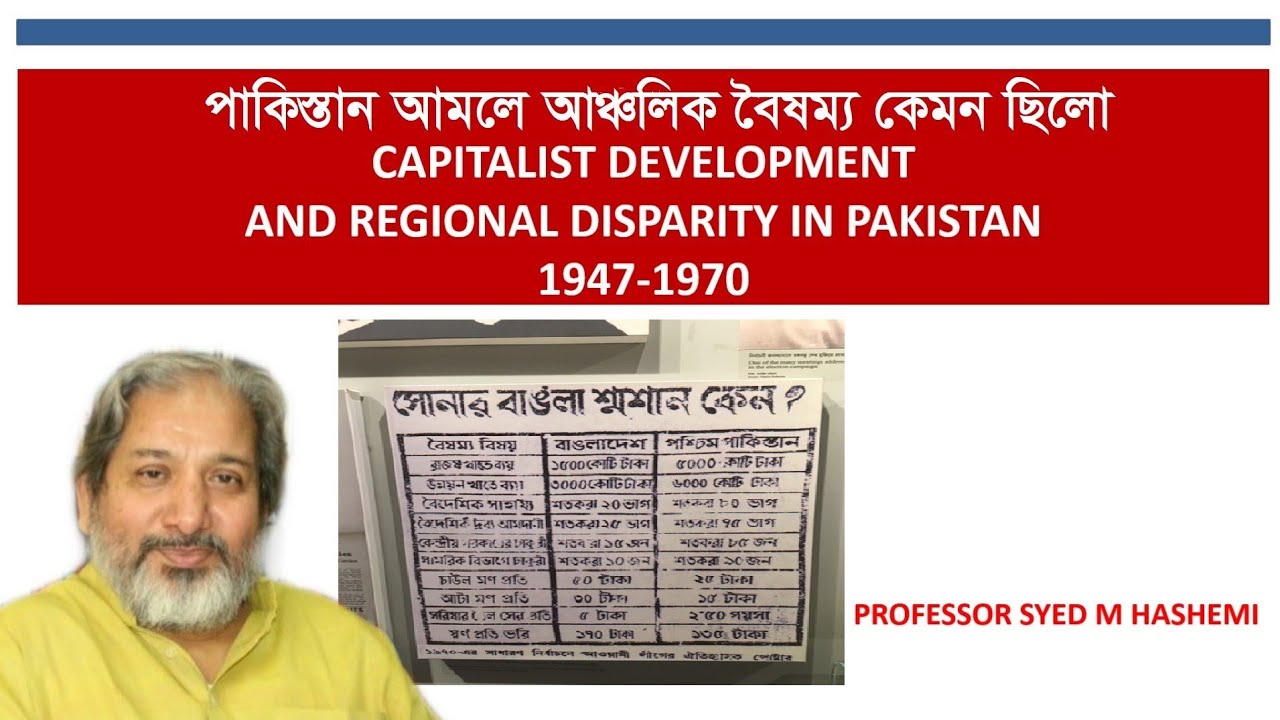The nature of the state in Pakistan (1947-1970), Part-1
Summary
TLDRThe lecture discusses the nature of the state in Pakistan from 1947 to 1971, focusing on the military-bureaucratic state and its role in shaping Pakistan's socio-political landscape. It examines class structures in West and East Pakistan, highlighting differences between the feudal aristocracy in the West and the emerging capitalist class in the East. The lecture also delves into post-colonial state dynamics, drawing on Karl Marx’s analysis of the state and Hamza Alavi’s theory of overdeveloped states, where a powerful military and bureaucracy guide the state's efforts to nurture capitalism amid weak bourgeoisie and landed classes.
Takeaways
- 🏛️ The lecture discusses the nature of the state in Pakistan from 1947 to 1971, focusing on the military and bureaucratic aspects.
- 👥 The class structure in West Pakistan was dominated by a large landowning class and traditional aristocracy, in contrast to East Pakistan which had a primarily peasant class.
- 🌏 The military and bureaucracy in Pakistan were heavily influenced by the British Raj, with a strong presence of Punjabis and Pathans, and very few Bengalis.
- 🏭 West Pakistan had little industry, while East Pakistan had an emerging capitalist class, but not a fully developed industrial one.
- 🌾 In East Pakistan, the class structure was different, with small zamindars and a significant peasant class, and a disconnect between the business class and the general population.
- 📚 Karl Marx's analysis of the state is mentioned, emphasizing that the state represents the interests of the dominant class in society, which in capitalist societies is the bourgeoisie.
- 🌎 Post-colonial societies like Pakistan have an overdeveloped state that is not directly representing any one class but is tasked with developing capitalism.
- 👮♂️ The military and bureaucracy in Pakistan are very strong and play a significant role in managing the state to ensure capitalist development.
- 🔄 The state in Pakistan is described as relatively independent, with no single class dictating terms, and it mediates between different interests.
- 💡 The lecture highlights the contradictions within the state and society in Pakistan, which contributed to the eventual dissolution of East Pakistan.
Q & A
What is the focus of the lecture?
-The lecture focuses on the nature of the state in Pakistan during the period from 1947 to 1971, specifically addressing the formation of the military-bureaucratic state and its relationship with the ruling classes.
What was the class structure in West Pakistan like?
-In West Pakistan, there was a large landowning aristocracy with individuals owning vast amounts of land. Many people working for them were virtually bonded laborers with limited freedoms. The traditional feudal aristocracy dominated this structure.
How was the class structure in East Pakistan different from West Pakistan?
-East Pakistan had smaller landowners compared to West Pakistan, and most large landlords were Hindus who left after partition. The class structure was more peasant-based, with fewer large estates or industrial capitalists, and the emerging bourgeoisie was disconnected from the local Bengali population.
What was the role of the military and bureaucracy in Pakistan after independence?
-The military and bureaucracy, which were largely composed of West Pakistanis, were highly developed and disciplined, inherited from British colonial rule. However, there were few Bengalis in these institutions, which led to a divide between East and West Pakistan.
What did Karl Marx suggest about the state in a capitalist society?
-Karl Marx suggested that the state in a capitalist society represents the interests of the dominant class, which in this case would be the capitalist class. The state protects private property and serves the capitalist class's interests.
How does Karl Marx's analysis apply to Pakistan's state development?
-Marx's analysis is applied to Pakistan by highlighting how the state, though initially feudal, evolved to protect emerging capitalist interests. However, in Pakistan, capitalism was not fully developed, and the military-bureaucratic state played a central role in managing the state's affairs.
What is the 'overdeveloped state' according to Hamza Alavi?
-Hamza Alavi describes the 'overdeveloped state' as one where the military and bureaucracy are extremely strong and relatively independent from the dominant classes. This state is responsible for promoting capitalist development, but no one class can fully control it.
What role did the military-bureaucratic state play in Pakistan?
-The military-bureaucratic state in Pakistan played a central role in managing and promoting capitalist development while balancing the interests of various weak classes, such as the landlords and bourgeoisie.
What was the relationship between East Pakistani bourgeoisie and the local Bengali population?
-The East Pakistani bourgeoisie, often non-Bengali and Urdu-speaking, were disconnected from the local Bengali culture and population. They did not consider themselves Bengalis and were culturally and socially distinct from the majority Bengali population.
What contradictions arose between the state and society in Pakistan during this period?
-Contradictions arose from the state's efforts to promote capitalist development, which often led to tensions between the state's priorities and the societal structure, particularly between the military-bureaucratic state and the underrepresented Bengali population in East Pakistan.
Outlines

このセクションは有料ユーザー限定です。 アクセスするには、アップグレードをお願いします。
今すぐアップグレードMindmap

このセクションは有料ユーザー限定です。 アクセスするには、アップグレードをお願いします。
今すぐアップグレードKeywords

このセクションは有料ユーザー限定です。 アクセスするには、アップグレードをお願いします。
今すぐアップグレードHighlights

このセクションは有料ユーザー限定です。 アクセスするには、アップグレードをお願いします。
今すぐアップグレードTranscripts

このセクションは有料ユーザー限定です。 アクセスするには、アップグレードをお願いします。
今すぐアップグレード関連動画をさらに表示

Sejarah Islam Di Pakistan Setelah Merdeka Tahun 1947 Dari India

পাকিস্তান আমলে আঞ্চলিক বৈষম্য কেমন ছিলো Capitalist Development and Regional Disparity in Pakistan

CONFIRMADO 🚨 Gov dos EUA mandou CIA dar recado para Generais do Brasil

Geo-Strategic Importance of Pakistan in South Asia- #nuclear#war#india#pak#CPEC#Pak-China#-(Part-1)

3 important cases in the Supreme Court || Rawalpindi rejected Nawaz Sharif

Ex-CIA Official’s 2011 Speech On Pak Military Goes Viral Amid Pahalgam Horror; ‘Worst Strategists…'
5.0 / 5 (0 votes)
